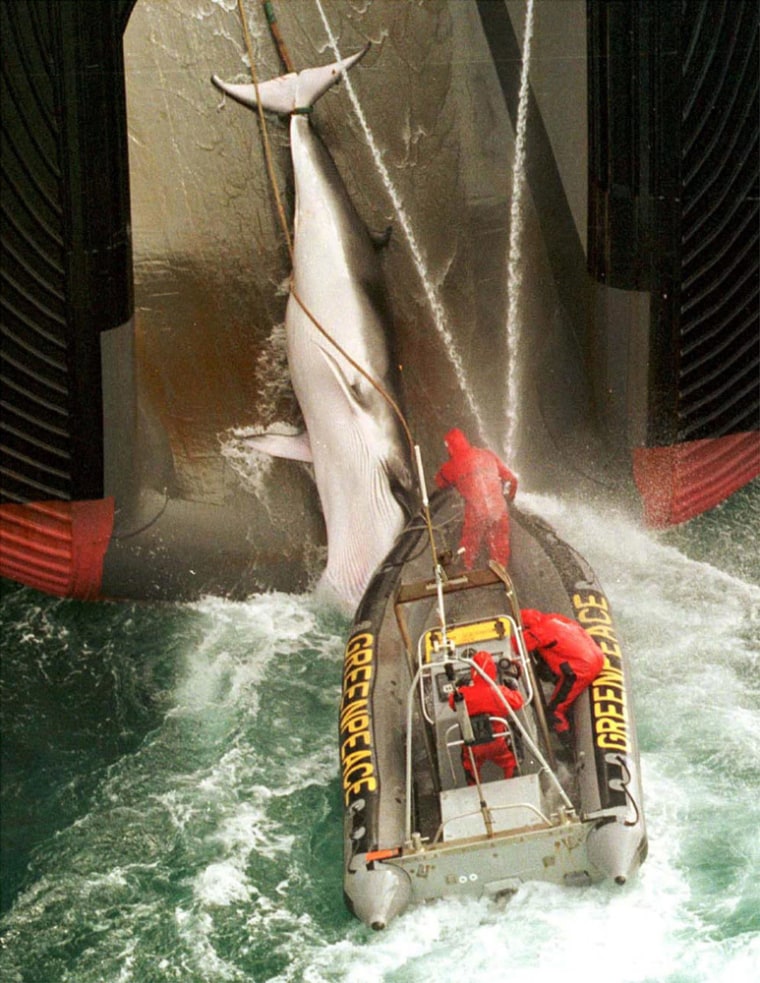Through the end of the month, fishmongers and restaurateurs across Japan are stocking up on one of the sea’s most pricey delicacies — hunks of fresh, deep red whale meat — brought in by a fleet of Japanese research whalers now operating off this country’s northern coast.
For nearly two decades, an international ban on commercial hunts has kept the yearly haul relatively small — only a thousand or so tons. But if Japan’s government has its way when the International Whaling Commission opens its annual conference on Friday, there could be a whole lot more coming in the years ahead.
“This could be a turning point,” Joji Morishita, a senior member of Japan’s delegation, told The Associated Press last week.
Shift in voting
Morishita said that after years of being in the minority, the voting power between the pro- and anti-whaling blocs has roughly evened out, with only a difference or one or two votes.
“There is much more of an atmosphere for dialogue,” he said. “Before, the anti-whaling camp was so strong they felt they didn’t need to talk. Now they do.”
Whaling opponents have been especially anxious ahead of this year’s IWC meeting, which begins May 27 in Ulsan, South Korea, because they fear pro-whaling countries may have a voting majority for the first time since commercial whaling was banned in 1986.
Reflecting such concern, New Zealand’s IWC commissioner, Sir Geoffrey Palmer, warned in March that “the likelihood is that in the next few years efforts to rescind the moratorium will succeed.”
A complete lifting of the whaling moratorium is unlikely. That would require not a simple majority but three-fourths of the vote. Still, pro-whaling nations may now be able to pass resolutions in support of Japan’s research whaling program or the resumption of limited kills, which would mark an important shift in tone.
“Japan isn’t saying it wants to go out and kill as many whales as it pleases,” Morishita said. “We welcome international supervision. If countries like Australia don’t want to eat whales, fine. But they have no right to impose their value judgments on us.”
Greenpeace takes action
Gearing up for an important battle, Greenpeace is already taking pot shots at the host.
In its pre-conference publicity push, the environmental group claims on its Web site to have discovered plans to build a whale and dolphin meat processing factory in Ulsan, where the meetings will take place from May 27-June 24. It said 50 activists set up a “Whale Embassy” camp near the site in protest.
South Korea has no whaling industry. Greenpeace claims, however, its accidental catches are “100 times greater than other countries,” and that a mature minke whale can fetch $100,000.
Despite the ban, whaling nations are expected to harvest more than 1,550 of the mammals this year.
The world’s only commercial whaling season began last month, with about 30 Norwegian boats pursuing their highest quota since the country resumed the hunt in 1993. Hunters are allowed by the government to harpoon 797 minke whales by Aug. 31. Last year, the quota was 670.
Norway is not bound by the worldwide ban imposed by the 57-member IWC because the group’s rules allow members to reject decisions they oppose.
A five-ship Japanese research fleet returned in March from the Antarctic Ocean, where it annually kills about 440 minke whales. Another scientific whaling program is currently underway in coastal waters in the northwestern Pacific, where Japan hunts another 210 whales.
Iceland resumed research hunts in 2003 after a 14-year hiatus.
Japan could quit group
Members of Japan’s ruling party are pressuring the government to withdraw from the IWC unless serious progress toward some sort of commercial whaling is made soon.
“Quitting the body is on the table,” Morishita said.
In the meantime, Japan intends to continue its research whaling program, which is in keeping with IWC bylaws but has been criticized by whaling opponents as a pretext to continue the commercial sale of whale meat. Proceeds from the sale of whale meat, along with smaller amounts of skin and blubber, added up to about $52 million in 2003. Profits are pumped back into the research program.
One pound of frozen whale meat goes wholesale for roughly $20, according to Junichi Noguchi, of the Tsukiji fish market in Tokyo. Meat from the flukes, or lobes of the tail, is considered the best cut and costs as much as $65 per pound.
“We are following the IWC’s own rules,” Morishita said. “We can’t let the meat go to waste.”
